Practicing Harp Happiness
#237: Music Angels: Leah Kim and the Transformative Power of Music
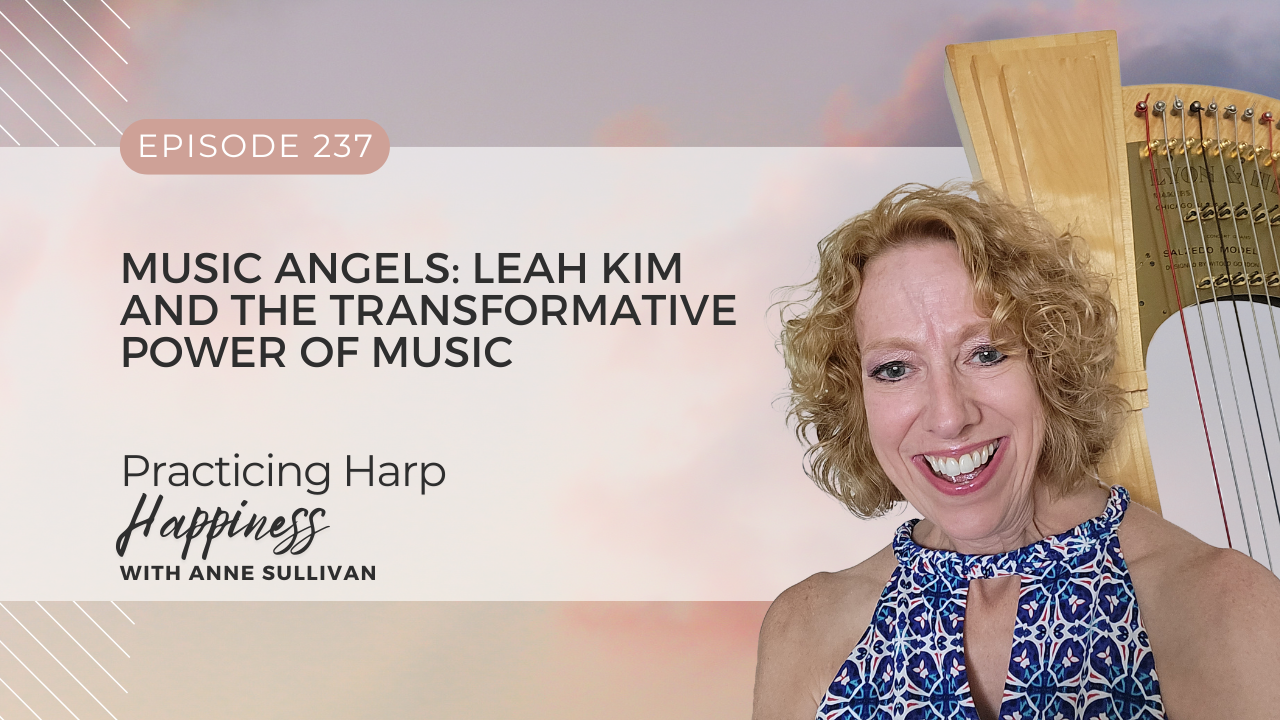
I don’t do very many interviews on this podcast. I started the show as a way to help harpists with their learning and I wanted, and still want, to be able to use this podcast to teach, to encourage and to inspire harpists all over the world.
But over the last year, I have realized that there are other voices I want to be sure that you hear. After all, learning comes in many forms and hearing a variety of voices and viewpoints enriches us and our harp playing in so many ways. So during 2026, one of my objectives is to bring you into conversations with harpists, musicians and others who inspire me. These are people I want you to meet, even if it’s only in this podcast format, because I want to share the inspiration that they have brought me with you.
So today, I want to introduce you to a new friend of mine, Leah Kim. Leah is a violinist and her story starts in South Korea. Her story is truly an awe-inspiring one, and as you will hear, she shared a lot of it in our conversation. Si...
#236: 7 Quick Fixes so You Can Play Your Stress-Free Best
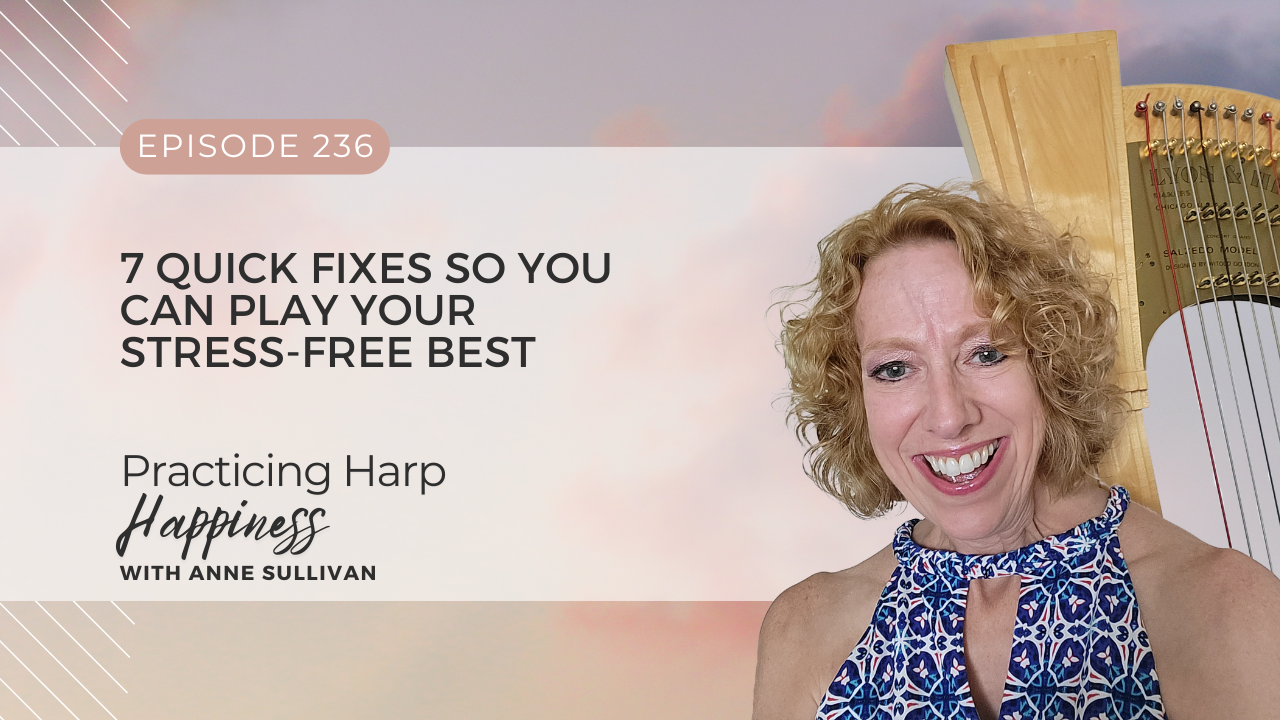
It’s time for a confidence boost.
You’ve been practicing your holiday music and feeling like you’re making good progress, but it’s not quite there and the performance date is coming up soon.
Your music is mostly fine. It has up days when everything goes perfectly and down days when it feels like you’ve never played the piece before. Maybe it’s not quite up to tempo. Or maybe there are just a few measures - or maybe more than a few - that are resisting all your attempts to learn them and play them smoothly. Whatever the issue is, it’s starting to be a little concerning because time is getting short.
We never want to feel unprepared or less ready than we would like for a performance, but sometimes it happens, despite all our planning and preparation. Believe me, I am the last person who would try to tell you that you should have started learning the piece sooner, or practiced more. I know all too well from my own experience that sometimes music just takes longer to come together t...
#235: Where Harp Beginners Go Wrong - and Maybe You Do Too
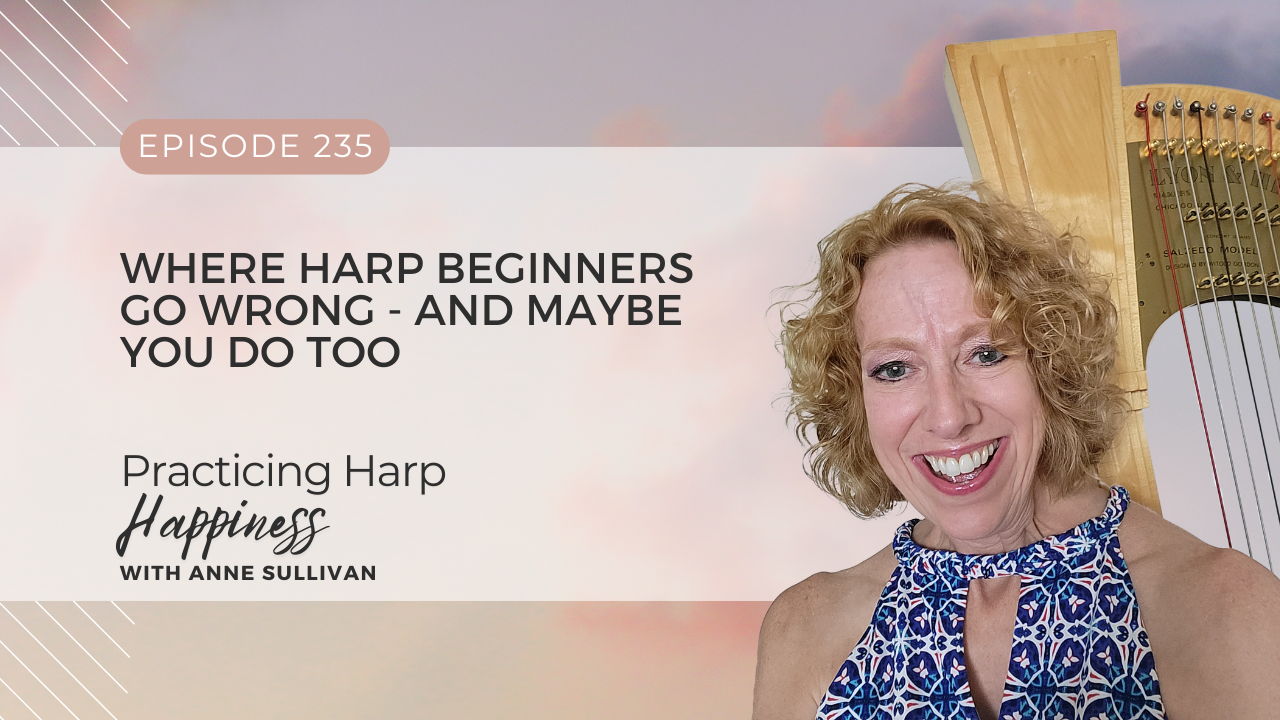
I know what I’m going to talk about with you today could be controversial. It could sound totally off target to you. Nevertheless, I hope you will hear me out.
I want to share with you why and how I think most harp beginners start wrong, even if they are working with a teacher. It isn’t exactly that we teachers aren’t teaching the right things or that we aren’t dedicated to the success of the students who are trusting us. It’s that the path we walk with them feels so slow.
Every individual comes to the harp with a unique skill set and level of musical experience, with their own learning style and level of commitment. But each student comes to the harp with the same objective: to play music on the harp. That’s why I started the harp, and it’s almost certainly why you did too.
So today I want to talk about the things that hold beginners back, that keep them from making the progress they want, from playing the music they want, in a timeframe that feels right to them. Most of these...
#234: Three Keys to Relieving Stress
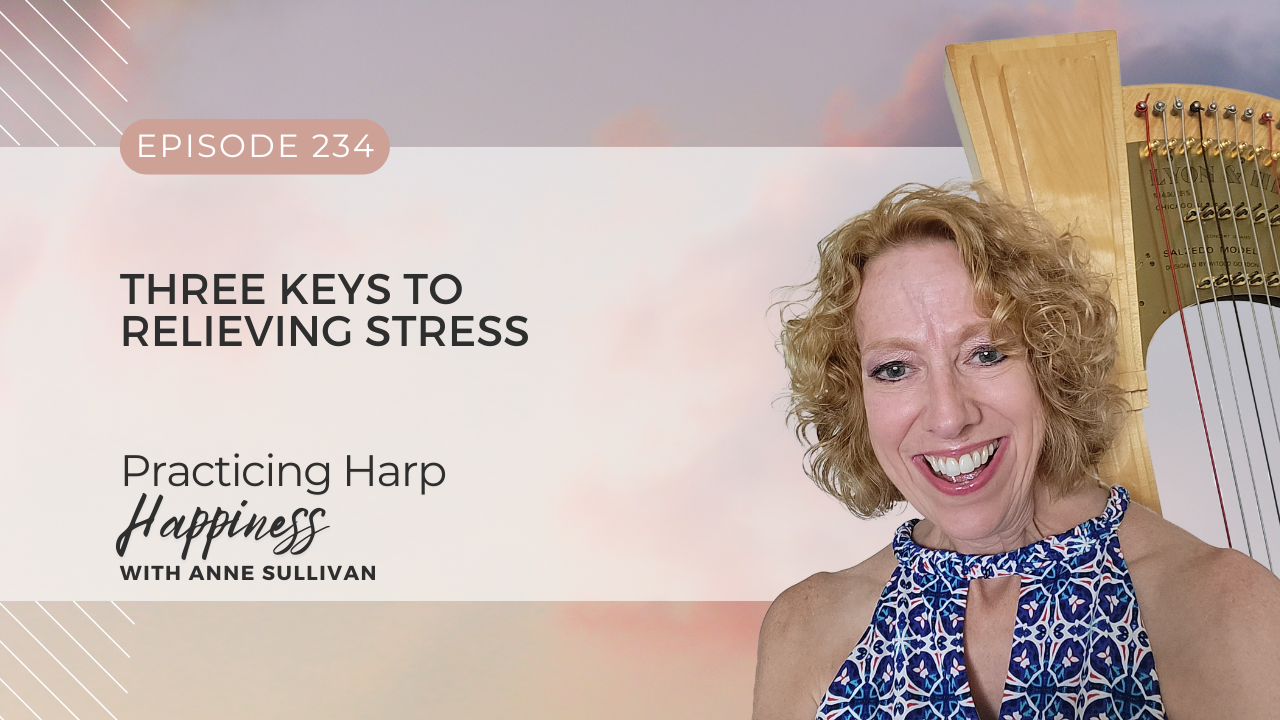
I was moving the harp the other day and once again, it occurred to me just how much stuff we have to carry around with us. Granted, I move my harp all the time for rehearsals and concerts - it’s a big Lyon Healy Salzedo model harp - so you would think I’d be used to it by now. I guess I am, mostly; I don’t have to think about what goes in the car, and my harp bag is always ready to go. But when I start counting the number of trips I have to make between my car and the concert hall in the pouring rain, I start wishing for a Star Trek transporter.
But recently, while I was moving the harp, my bench, my stand, and my bag, I had a flash of insight; we harpists carry a lot of baggage with us. Not a revelation, I know, but it led my mind to consider the other kind of baggage we harpists carry, the stress that accumulates in our practice and performance. That’s a kind of baggage that piles up in a sneaky way until one day, we find it has overwhelmed us. The physical stress that is part ...
#233: A Behind the Scenes Look at My Practice Week
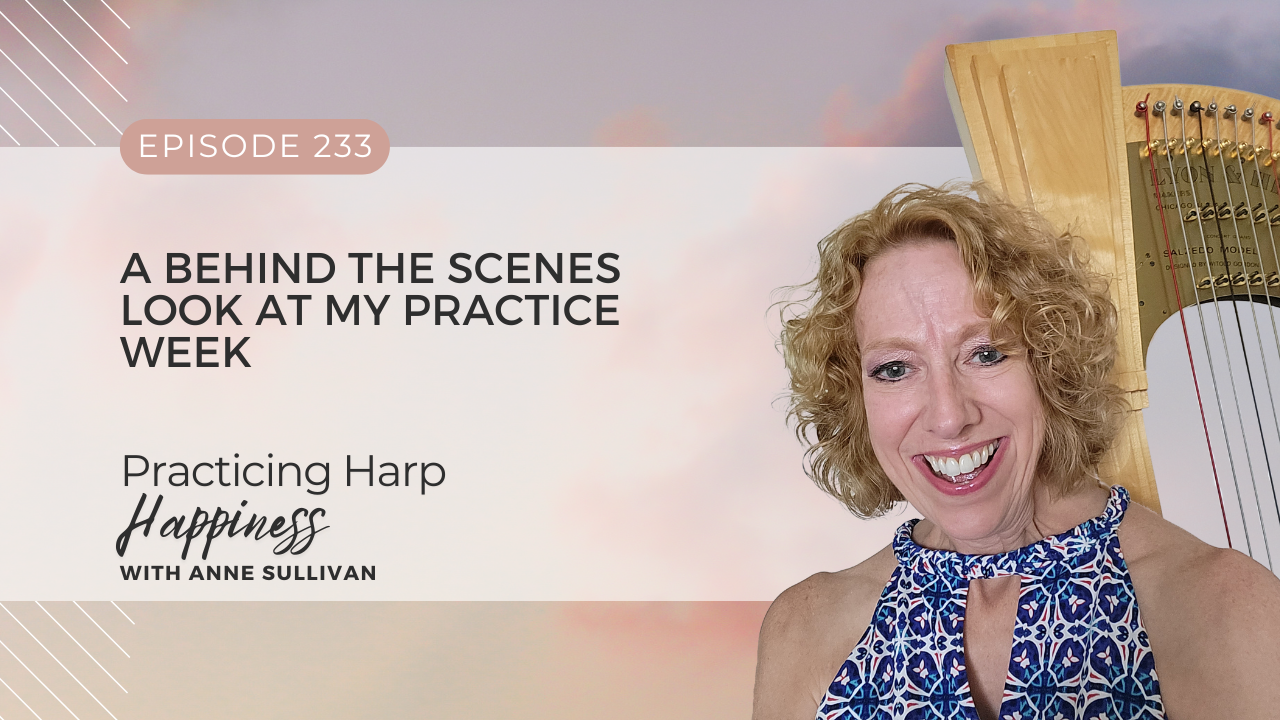
Over the years I have had questions about my practice: how much practice I do, what I do in my practice, and so on. There has also been the occasional request to sit in and listen to my practice. I have always thought that my own practice routines and what I do on any given day in my practice wouldn’t be useful to share with most harpists, the reason being that the demands on my time and on my playing are vastly different from what the majority of harpists experience. And I have never believed that anyone could benefit from watching me practice or listening to my practice.
But gradually I have been led to rethink that opinion. My thinking started to change with the introduction of Practice Labs in our Harp Mastery® Hub.
In case you don’t know what our Practice Labs are, I will fill you in. They are online meetups that any of our Hub members can join, and all that happens is we practice in the same virtual space for an hour and a half. Our cameras are either on or off, and our mi...
#232: Starting a Piece? Don’t Take It From the Top
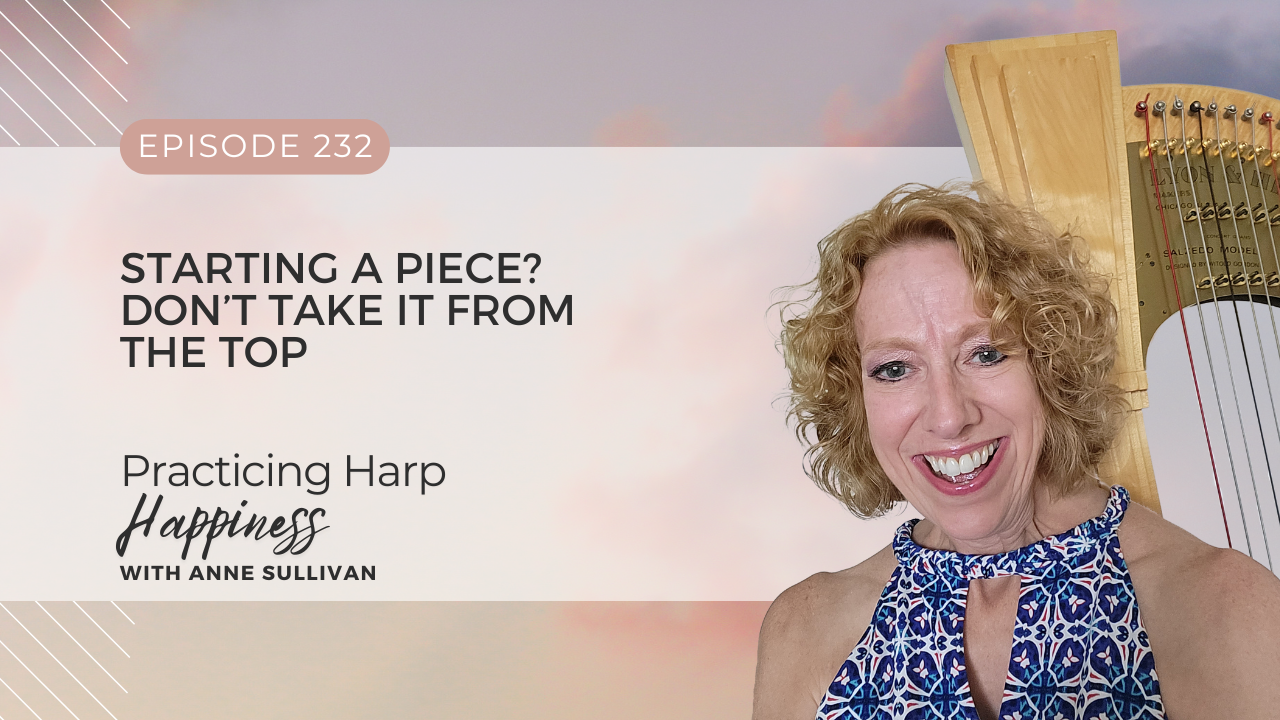
So you decided to learn a new piece for the holidays - good for you! When I think of all the years I’ve been playing the harp, it’s a little amazing that I still feel a little thrill when I pick up a new piece of music to learn, and I’m sure you feel the same. Starting a new piece is a voyage of discovery with the promise of adventure, new notes to conquer, a few challenges to meet along the way, and finally, a beautiful piece of music we can play.
Of course, the voyage is often a little rougher than we anticipate. It can take longer than we thought and can be more discouraging. We can’t always eliminate the difficulties or estimate exactly how long it will take us to learn a piece. However, we can give ourselves the biggest advantage we can by getting the strongest and fastest start we can to the piece.
One of my frustrations with the way harp learning is often taught is that it teaches the student to be slow. Certainly playing slowly and learning carefully are necessary to devel...
#231: Your Simple Six Week Holiday Music Readiness Plan
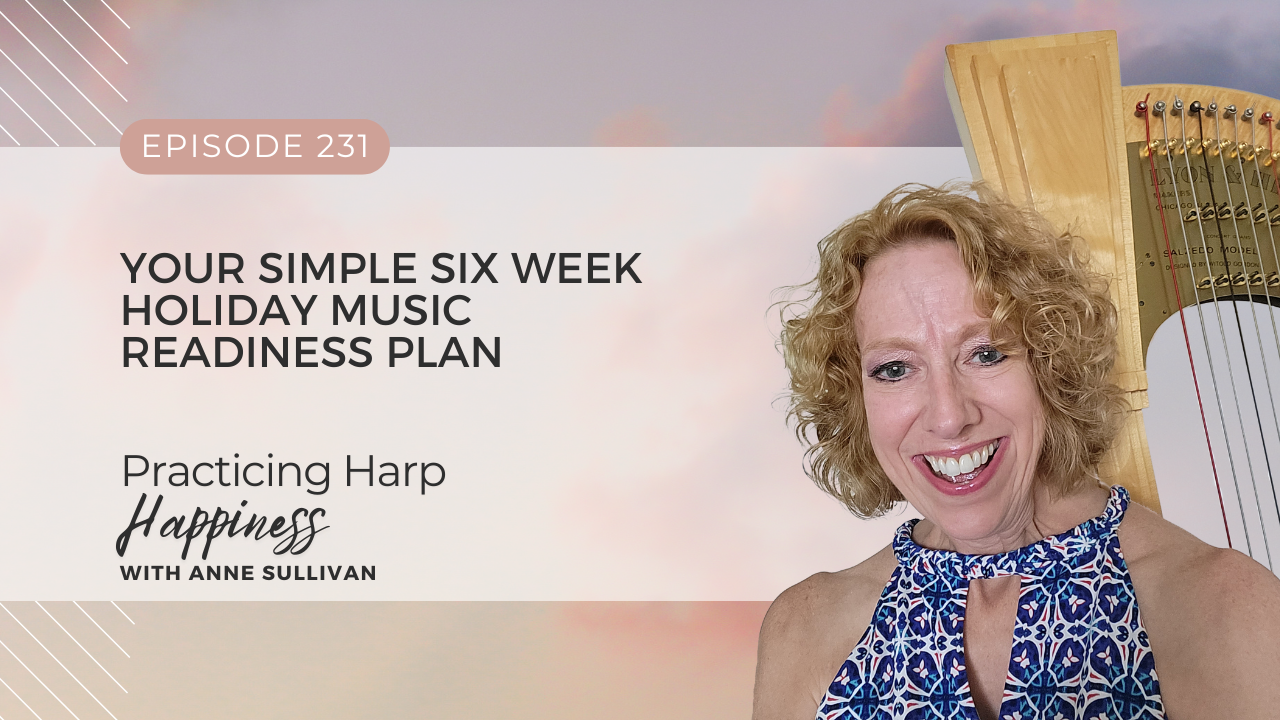
It’s nearly the end of October and already my daily practice is revolving around what I will need to play this holiday season. Yours might be too. The smart harpist knows that this is the time to plan your practice carefully so that you don’t have to cram practice time into an already overloaded holiday schedule. If we feel prepared to play going into the holiday rush, it makes everything about the holidays more fun.
So now is the time to plan. We have about six weeks from now until the end of November. In my own planning I usually use our Thanksgiving as my target date to have my music ready. If you’re not up to speed on American holidays, our Thanksgiving is the fourth Thursday in November, so date-wise, it’s a movable feast, but as it marks the kickoff for our holiday rush, it’s a great target date for music readiness.
Today, I want to share what I think is the easiest and most realistic schedule for making sure whatever music you have to play this December will be ready. I sta...
#230: Here’s Why You Should Do It My Way: A Teacher’s Response
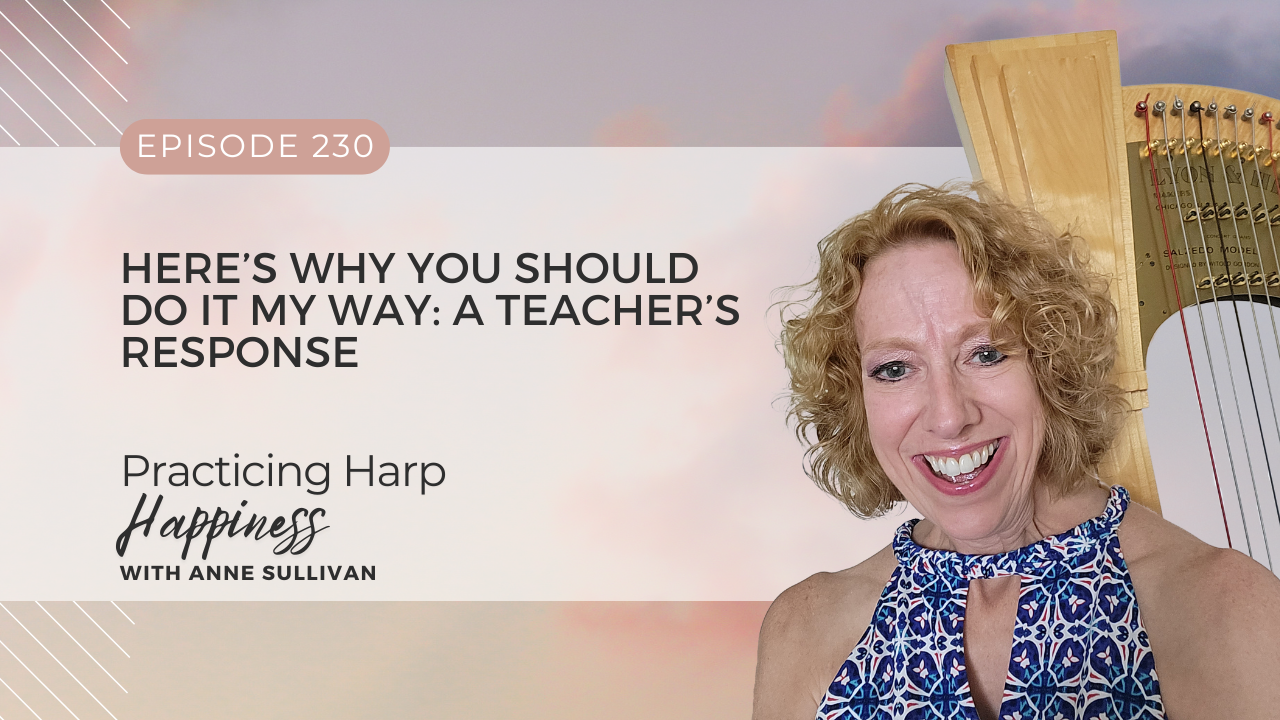
I once had a student say this to me: “But it doesn’t work when I do it that way.”
We were trying to fix a passage in a piece she was learning. When she played the passage for me, there was an obvious stumble spot, and I had a definite idea about what was wrong and how to fix it. But after a week of trying to implement my suggestion, she came back to me, saying that her old way, even though it wasn’t really working, worked better than mine and so she was sticking with her way.
Please understand that the student didn’t doubt the solution I was offering. She had tried it, just as I had suggested. She had confidence in my ability to help her surmount this difficulty. The frustration for her was not just that the solution I offered didn’t work; it was that her old way was actually better for her, at least at that moment.
At that point in our lesson, I could have responded with the all-time favorite response of music teachers everywhere - you have to give it some time. That would cer...
#229: The 3 Things All Harpists Need to Do Well
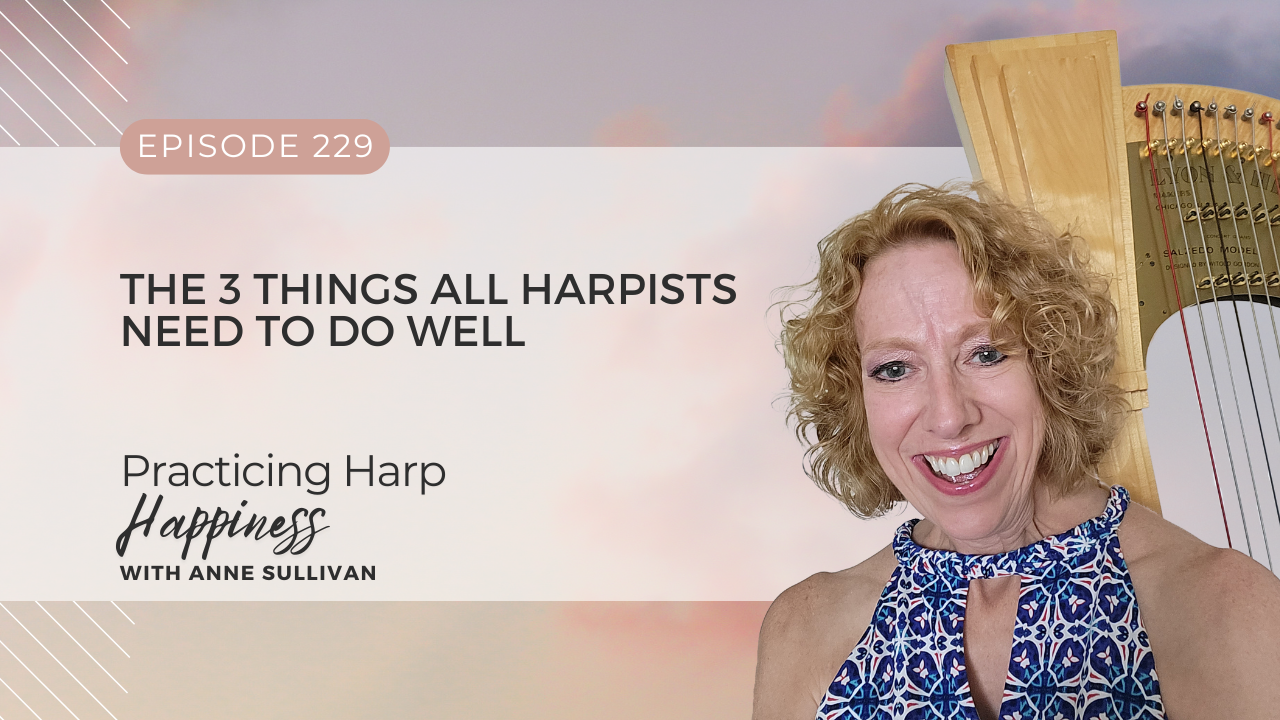
If I were to ask you what you think the most important skills are for any harpist, what would you say?
There are lots of obvious choices. You might include technical skills, like scales or arpeggios or putting hands together. You could mention skills like note reading, or sight reading, or rhythm skills or knowing basic music theory. What about working with a metronome or playing expressively? All of these are important, and none of them is particularly easy.
While all of these are crucial, I consider them all just part of playing the harp. Every harpist develops these skills continually, every day, over a lifetime of playing. Some of them come more naturally than others, but we become more skillful in all of them over time. It’s also a fact that neglecting one of these essential elements - and my list was by no means a complete one - will limit our playing at some time in some way.
Today, though, I want us to think about a different category of skills, skills that are less abou...
#228: The Real Reason to Memorize Your Music
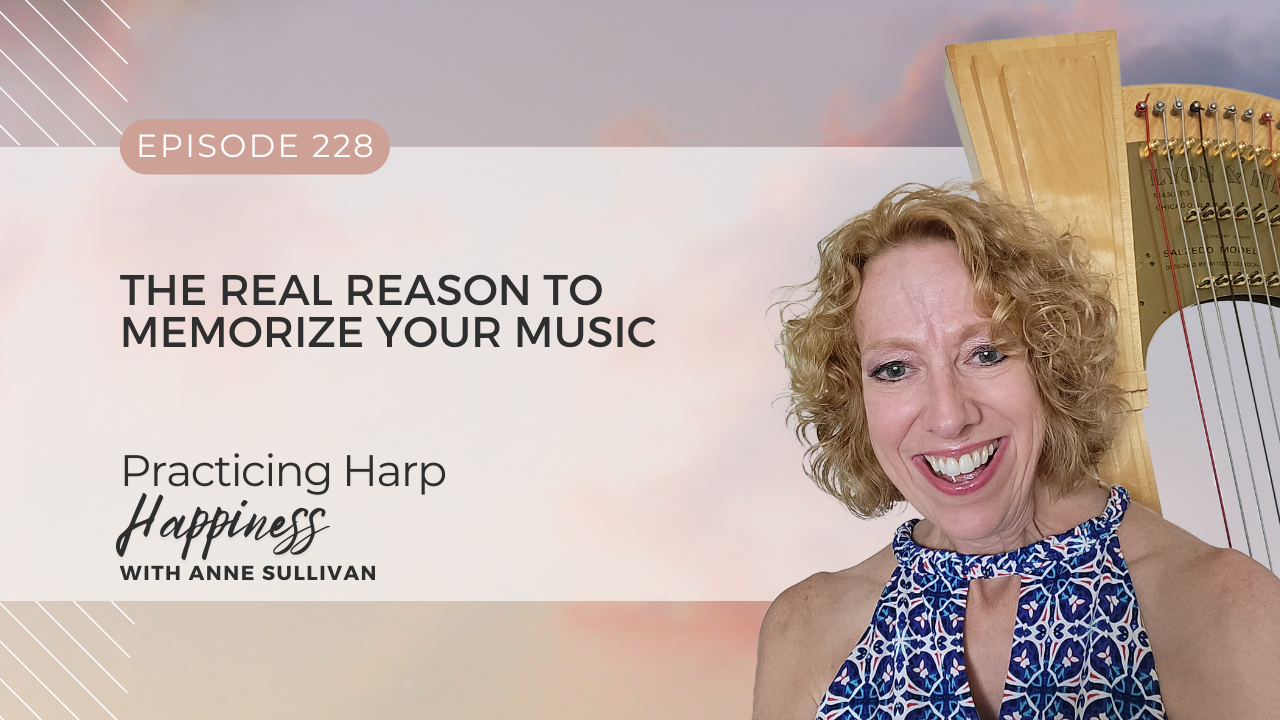
Do you have to memorize your music? Of course not. How’s that for an easy answer. Okay, the podcast is over and we can call it a day. But of course, the answer isn’t that simple.
No, you don’t have to memorize your music, but the fact that you’re asking the question tells me that you’re almost certainly thinking about memorization the wrong way, or at least very differently from how I have learned to think of it.
What I want to help you understand today is the role that memorization can play in your musical growth, how it can make you a better musician, how it can help you learn music faster, not necessarily because you are memorizing, but because the act of memorizing brings your focus to the music in a different way.
But not if you’re trying to memorize the way you may have when you were young. The kind of effortless assimilation that came so easily to me when I was younger, and perhaps to you too, doesn’t happen with my aging brain. I still memorize, but I use a process that ...

